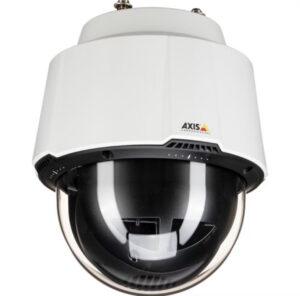While 4K security cameras offer advanced features compared to traditional cameras, they cannot replicate the full range of capabilities of human eyesight.
Here are a few key differences:
- Field of View: While 4K cameras can capture a larger field of view compared to traditional cameras, they still have a limited field of view compared to human eyesight. Humans can perceive a 180-degree field of view without moving their eyes. Whereas most cameras have a field of view of 90 degrees or less.
- Depth Perception: Human eyesight includes depth perception, which allows us to perceive objects in three dimensions. While 4K cameras can capture detailed video footage. They cannot replicate the full depth perception of human eyesight.
- Color Perception: Human eyesight can perceive a wider range of colors than most cameras, including subtle variations in hue and saturation. While 4K cameras can capture high-quality color video footage. They may not be able to fully replicate the complexity of human color perception.
- Adaptability: Human eyesight can adapt to changes in lighting and environmental conditions quickly and easily. Whereas cameras may require adjustment or specialized features to capture accurate footage in varying conditions.
In summary,
while 4K security cameras offer advanced features compared to traditional cameras. They cannot replicate the full range of capabilities of human eyesight. However, they can provide valuable and detailed video footage to aid in security monitoring and investigations.
Human eyesight at night, also known as scotopic vision, is different from daytime vision. In low-light conditions, the human eye relies more on rod cells. Which are more sensitive to light but are not as effective at detecting color or detail as cone cells, which are responsible for daytime vision.
At night, human eyesight may have limited distance vision, depending on the amount of available light. In complete darkness, the eye may not be able to see objects at a distance at all. However, under low-light conditions, the eye can still detect objects at a certain distance.
Factors that can affect distance vision at night include the amount of available ambient light. The size and contrast of the object, and the age and visual acuity of the individual. For example, younger individuals with good eyesight may have better distance vision at night than older individuals with poor eyesight.
To improve distance vision at night, individuals may use artificial light sources such as flashlights, streetlights, or headlights. Night vision goggles and cameras with infrared illumination can also enhance vision in low-light conditions. However, it’s important to remember that even with technology, distance vision at night may still be limited compared to daytime vision.
Please call LA security cameras for a free estimate at 213-761-7900
In the realm of security, the advancement of technology has brought about significant improvements in surveillance systems. One of the most notable advancements is the 4K security camera, which offers unparalleled resolution and clarity compared to older models and even human eyesight. This article explores the key differences between 4K security cameras and human vision, highlighting why these cameras are indispensable for modern security needs.
Resolution: The Power of 4K
One of the most significant advantages of 4K security cameras is their resolution. With a resolution of 3840 x 2160 pixels, 4K cameras offer four times the detail of 1080p cameras. This high resolution allows for clearer images, enabling security personnel to discern fine details such as facial features and license plate numbers, which are often crucial in investigations.
Field of View: Capturing More with Each Frame
Human vision covers a wide field of view, approximately 180 degrees, but it requires constant eye movement to capture details across this range. In contrast, 4K security cameras can provide a wide-angle view without sacrificing detail. Some 4K cameras offer a field of view up to 130 degrees, ensuring comprehensive coverage of large areas with fewer cameras.
Reliability: Unbiased and Unfaltering
Unlike human eyes, which can tire and miss details, 4K security cameras provide constant, reliable surveillance. They operate tirelessly around the clock, ensuring that every moment is captured without fail. This reliability is critical for security purposes, where every second counts.
Conclusion
In conclusion, 4K security cameras offer numerous advantages over human eyesight for surveillance purposes. Their superior resolution, wider field of view, enhanced night vision, and reliability make them an essential component of modern security systems. As technology continues to advance, the role of 4K cameras in ensuring safety and security will only become more prominent.


